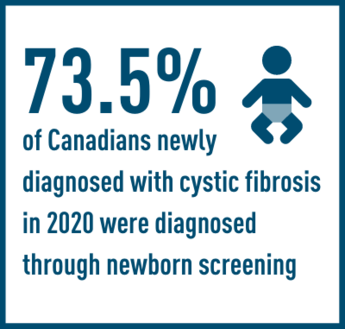CANADA CONTRIBUTES TO THE GLOBAL CF CONVERSATION: GENETIC THERAPIES, THE CHANGING CF LANDSCAPE, AND EQUITY ISSUES DRIVE AGENDA AT THE EUROPEAN CF SOCIETY CONFERENCE
Cystic Fibrosis Canada’s Chief Scientific Officer, Dr. Paul Eckford, recently attended the European CF Society’s annual conference where important advances in research and clinical care were shared.
An important topic of discussion at the 2023 ECFSC was the impact of modulator therapies both in individuals with CF and on healthcare. At the conference, real world data on the long-term use of CFTR modulator therapies in people with cystic fibrosis was presented, showing early promising results, however, we need to monitor real world data from patients on Trikafta for a much longer period of time to draw definitive conclusions. This data will continue to be collected globally to monitor the impact of these therapies on lung function, infections and other measures of health over time. Researchers and clinicians are also starting to have important conversations about how care will change in the era of highly effective modulators as younger people with CF start to have access to these drugs before significant damage has occurred in the body. With CFTR modulators, CF patients will have different needs of the CF healthcare system as they age.

The global cystic fibrosis clinical trials networks, including CF Canada’s clinical trial network CF CanACT gathered to discuss global strategies for prioritization of clinical trials for gene-based therapies. This will help ensure that the most important and most likely to succeed clinical trials are able to meet their recruitment targets. Several companies are advancing genetic-based therapies toward clinical trials, and some have already started first-in-human trials in other areas of the world. Dr. Eckford and the CF CanACT team met with several of the companies developing genetic therapies for CF. For those whose mutations won’t benefit from CFTR modulator treatments, and for those who can’t tolerate these drugs, a genetic based therapy holds promise. We anticipate the first of these trials will come to Canada within the next few years.
At the conference, cystic fibrosis registry leads from around the globe met to share information and consider how they can work together to answer questions that will impact the health outcomes of those with cystic fibrosis. An important example highlighted was the global collaboration between registries early in the pandemic to understand the risks of COVID-19 infection in cystic fibrosis patients.

Canadian researchers were prominently featured at 2023 ECFSC including Cystic Fibrosis Canada-funded researcher, Dr. Bradley Quon, who discussed the impacts of CFTR modulator drugs beyond the lung, and Dr. Amy Wong, a CF Canada funded researcher who discussed how stem cell models of CF tissues may help with CF drug development and expand access to these therapies. Researchers from across Europe shared their results examining patient tissues, such as nasal cells, for helping to understand which patients with rare mutations may benefit from modulators, as CF Canada-funded researchers are doing with the Cystic Fibrosis Individualized Therapy Program at SickKids.
Gaps in health outcomes and quality of care existed before the development of CFTR modulators, but now as cystic fibrosis patients in Canada and some other countries are celebrating improved health for many with access to modulators like Trikafta, those with cystic fibrosis in poorer countries are falling further behind. Disparities in health outcomes for CF patients in lower- and middle-income countries was an important topic at the event.
Registry data presented from countries in Europe clearly demonstrated the widening gap in health measures such as lung function, body weight and infections. Cystic fibrosis patients in poorer regions of the world urgently need access to highly effective cystic fibrosis modulator drugs. Cystic Fibrosis Canada last year joined other cystic fibrosis organizations to call upon the manufacturer of these treatments to make them available in lower-income countries, and we continue to press for equitable access for all who can benefit from these life-changing drugs, within Canada and around the world.




